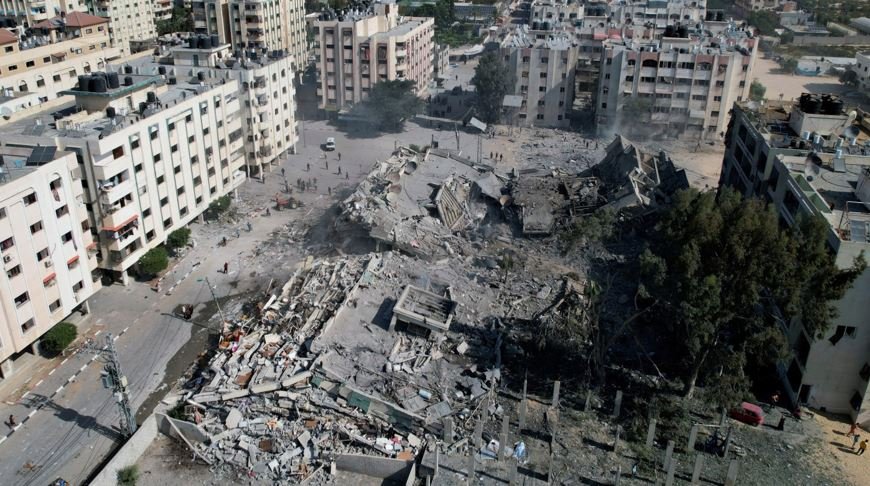The global economic recession stemming from the conflict has not substantially impacted the Bangladeshi economy. The proactive steps taken by The Awami League government to fortify the financial sector deserve recognition for this stability.
The conjunction of the Israel attacks and the ongoing Ukraine conflict has escalated geopolitical tensions. An escalation conflicts or increased geopolitical tensions in other regions has the potential to diminish global economic activity and lead to higher worldwide inflation.
Although the global economic downturn triggered by the war has not yet significantly affected the Bangladeshi economy, credit for this largely goes to the proactive measures taken by The Awami League government to strengthen the financial sector. Consequently, the instability within the financial sector is gradually abating, and there is an observable increase in liquidity injections into banks.
You can also read: Hamas’ Humanitarian Gesture Eases Oil Market Tensions
Escalation of Tensions in the Middle East
The United States Federal Reserve issued a stern warning on Friday 12th October, emphasizing that recent developments in the Middle East, particularly the ongoing conflict in Israel and the Russia-Ukraine war, have the potential to harm the global economy and exacerbate inflationary pressures. These two significant geopolitical crises have sent shockwaves through the international community, raising concerns about their far-reaching implications.
In addition to the Israel-Gaza conflict, the situation has further escalated with exchanges of fire occurring along Israel’s northern border with Lebanon, where the Hezbollah is based. This escalation has sparked concerns that the conflict may spill over into neighboring countries, dragging more nations into the quagmire and heightening regional instability.
The key concern raised by the Federal Reserve is the potential harm to the world economy. Geopolitical crises like those unfolding in the Middle East can disrupt the flow of goods and services, causing supply chain disruptions and market uncertainties. The Middle East is a critical region for energy production, and any escalation in the conflict can lead to fluctuations in oil prices, which in turn can have a cascading impact on the global economy.

Mitigating banking stress
The report also highlighted that policy measures taken earlier this year (2023), in response to the sudden and severe collapse of Silicon Valley Bank (SVB), played a pivotal role in reducing the pressures within the banking system that emerged in March. SVB’s collapse was triggered by a bank run prompted by investors’ concerns about its exposure to interest rate risk, exacerbated by the Fed’s assertive interest rate hike campaign.
The subsequent tumult led to the failure of several other US banks and, as a result of these events, the Swiss banking giant Credit Suisse merged with its regional counterpart UBS under significant pressure. The report noted that, since March, there has been a decline in volatility, and deposit outflows have largely stabilized for the banks affected by these challenges. Nevertheless, these banks continued to grapple with difficulties as they adapted to changes in depositor behavior, coped with increased funding costs, and faced reduced market values for their investment securities.
Geopolitical risks top list of global business threats
The latest survey by Oxford Economics reveals that businesses consider geopolitical tensions to be the most significant threat to the global economy at present. Approximately 36% of businesses polled view geopolitical tensions, such as those related to issues over Taiwan, South Korea, and Russia-NATO, as the top current risks.
The war in Ukraine, as outlined in a November 2022 OECD report, constituted a significant and unprecedented disruption to energy markets. This “shock” from the conflict played a central role in restraining economic growth in 2022, with the year’s growth rate registering at a mere 3.1 percent. Consequently, the OECD’s projections anticipate a further deceleration to 2.2 percent in 2023.
This marks a notable shift in perceptions of economic risks for businesses, as a similar survey conducted in April showed that nearly half of the respondents were more concerned about either a significant tightening in credit supply or a full-blown financial crisis as the top near-term risk.
The commencement of the war and the subsequent imposition of sanctions have led to the disruption of direct supply chains with both Russia and Ukraine, as well as supply chains passing through Russia to reach Asia. This disruption has resulted in substantial price hikes across various categories, including raw materials, energy, intermediate goods, and transportation services. Notably, fuel prices have doubled, and gas prices have tripled as a consequence. Furthermore, there is an expectation of further price escalations in the medium term.
Bangladesh achieved notable advancements
While the global economic downturn resulting from the war has yet to significantly impact Bangladesh’s economy, this is primarily due to the Awami League government’s proactive efforts to enhance the financial sector. As a result, the financial sector’s instability is gradually subsiding, and liquidity injections into banks are on the rise. In recent years, Bangladesh has achieved notable advancements in economic growth, poverty reduction, and human development. These achievements result from a synergy of factors, including a burgeoning domestic market, cost-effective labor, and the expansion of its manufacturing sector. According to the World Bank’s data, Bangladesh’s GDP has maintained an average annual growth rate of 6.5 percent over the past decade.
In addition to the worldwide crisis, Bangladesh faces its own set of hurdles. The country’s anticipated graduation from the Least Developed Country (LDC) status in 2026 will usher in various transformations, including alterations in market access and financial incentive programs.
The convergence of conflicts in the Middle East and Ukraine has amplified geopolitical tensions with potential far-reaching consequences for the global economy. As concerns about supply disruptions, energy markets, and inflationary pressures rise, it is evident that political instability can have a significant impact on financial stability and economic growth. While Bangladesh has managed to weather the storm due to proactive measures, the evolving global landscape poses challenges and opportunities for economies worldwide, making it crucial to stay informed and prepared for future uncertainties.


